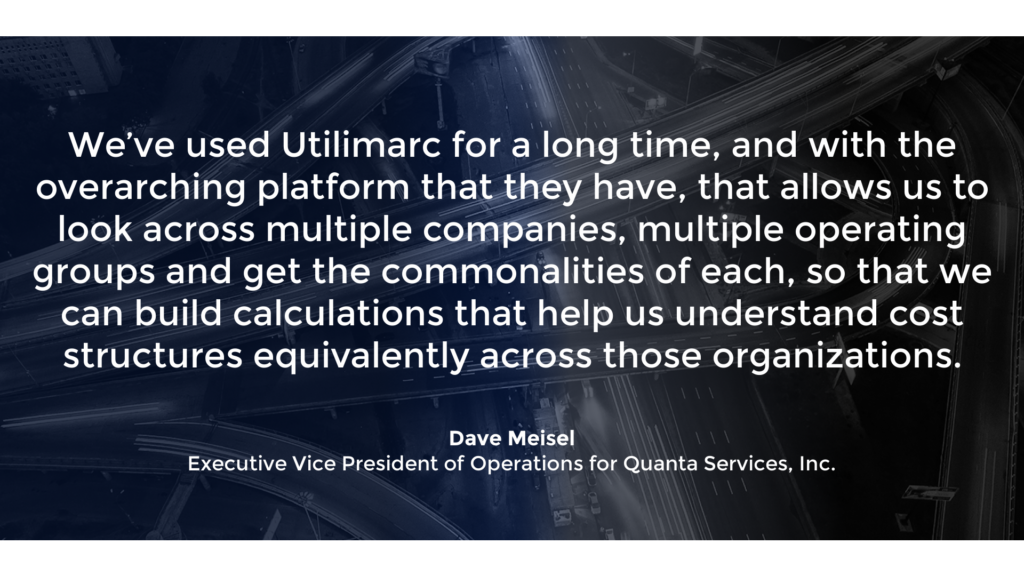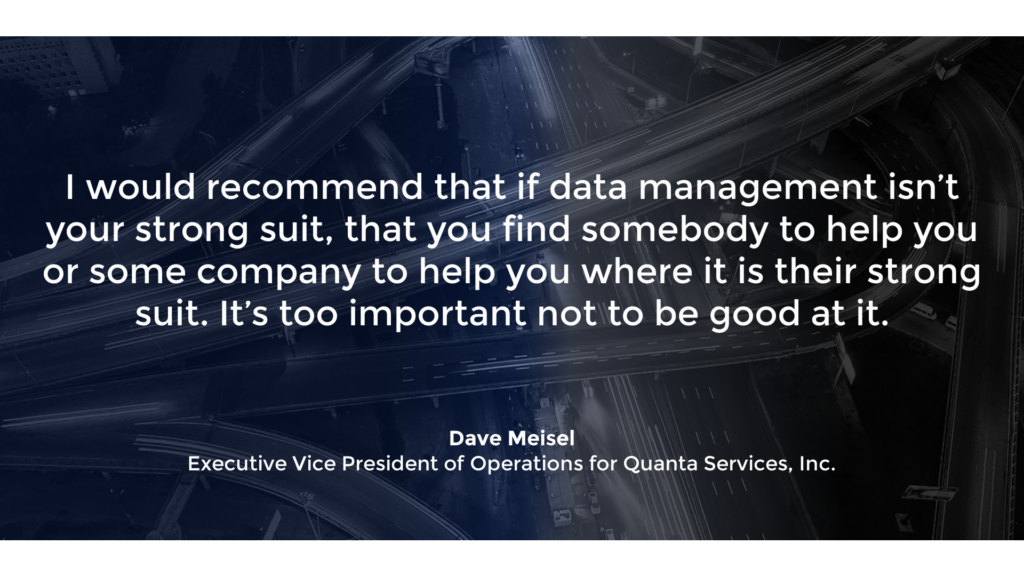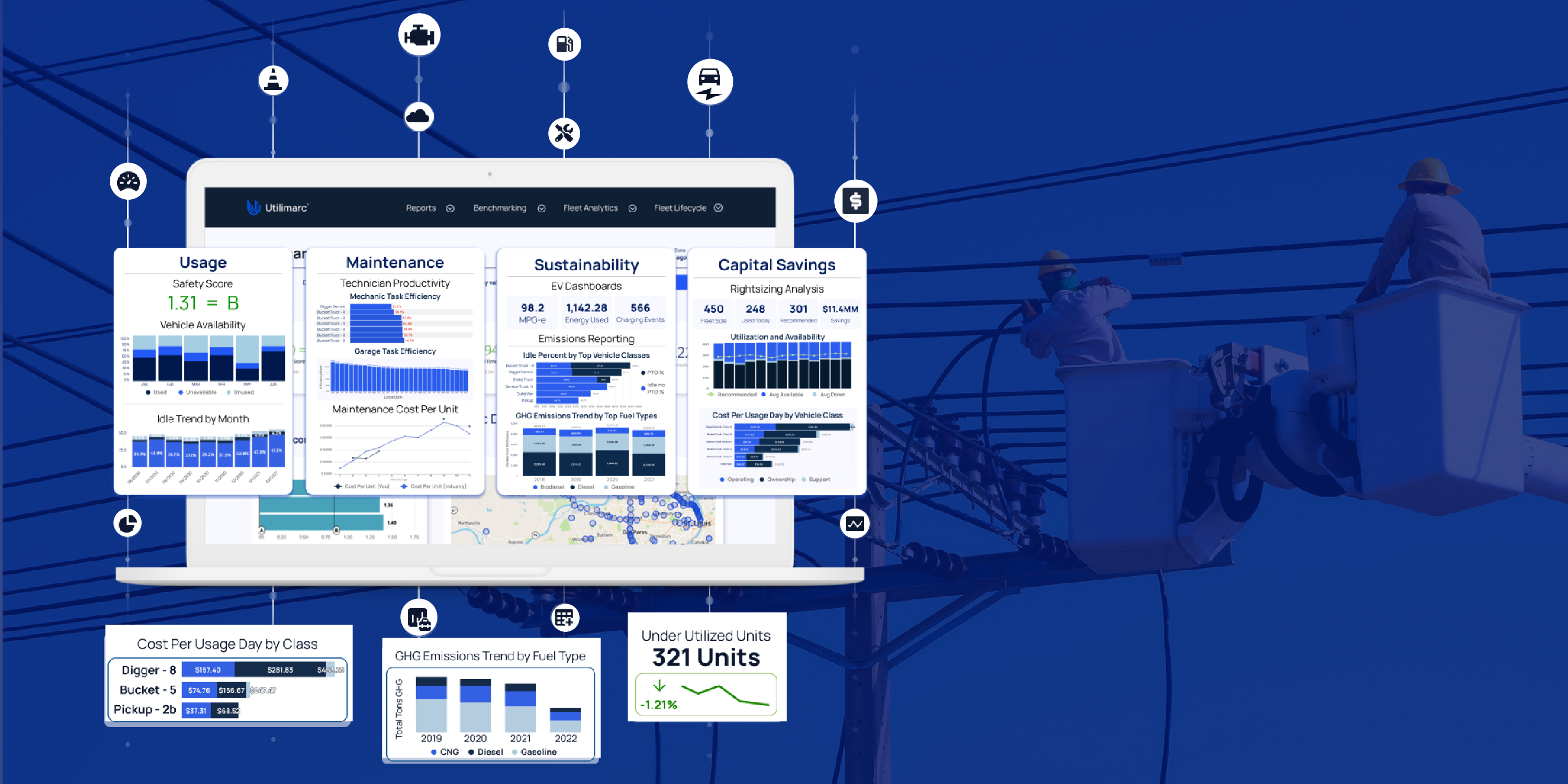
How Can We Better Manage Our Fleet Data?
Understanding your data is a crucial aspect to fleet management. It’s true when you’re growing your fleet, looking to expand, fine-tune your operations and nearly every facet of the management process. Fleet managers know that as their fleets get larger, the data they have grows exponentially – both in quantity and importance. But where does that leave them?
This week on the Fleet FYIs Podcast I’m joined again by the Executive Vice President of Operations for Quanta Services, INC., Dave Meisel, and this week, we’re wrapping up the last part in the three-part series with an episode fully dedicated to asset management and data management platforms.
Here’s a quick summary of my conversation with Dave:
Data management is a crucial aspect of having a well-run fleet. But as your fleet grows, so does the data. Many fleet managers are turning to data management platforms to help them with the day to day tasks – especially if they’re operating fleets with 1,000s of vehicles that could even span the world. Here’s what Dave had to share:

“We’ve used Utilimarc for a long time, and with the overarching platform that they have, that allows us to look across multiple companies, multiple operating groups and get the commonalities of each, so that we can build calculations that help us understand cost structures equivalently across those organizations.”
Dave Meisel, How Can We Better Manage Our Data? By Hand or By Platform? | Utilimarc Fleet FYIs Podcast
“I would recommend that if data management isn’t your strong suit, that you find somebody to help you or some company to help you where it is their strong suit. It’s too important not to be good at it.”

This is the last episode in the three-part series where Dave and I break down a few aspects to sustainability and what to look forward to this year in fleet that you may not have thought about. If you’d like to have a listen, it’s available to stream on all major platforms – but if reading is more your style, take a look at this episode’s transcript below:
How Can We Better Manage Our Data? By Hand or By Platform? | Fleet FYIs: Season 2 Episode 4
Gretchen Reese (00:06):
Hey there, welcome to Fleet FYIs, the weekly podcast by Utilimarc that reveals how you can make the most of your data for smarter fleet management. My name is Gretchen and every week you’ll hear from me and some of the industry’s finest in candid conversations that will shed some light on not only two decades worth of data insights, but some of the industry’s hottest talking points and key metric analysis with the aim to help you better understand your fleet from every angle. But before we begin, if this is the first time you’ve heard our show, thanks for stopping by. I’m so glad you decided to come along for the ride with us, but I’ve got a quick favor to ask you, once you’ve finished today’s episode, if you could take a few minutes to leave us a review on your favorite podcasting platform, we would really appreciate it.
Gretchen Reese (00:51):
Give us a rating, five stars I hope, or tell us what you liked or leave us a comment or a question about what you’ve heard in today’s episode. But if we haven’t yet covered a topic that you’re interested in hearing more about, let us know. We would be happy to go over it in detail in a later episode. If that sounds good to you, let’s get back to the show.
Gretchen Reese (01:09):
Hey everyone, and welcome back to another episode of the Fleet FYIs podcast. Before we get started for today, I wanted to take a moment to say that I hope you’re all doing well and to everyone currently in the Southern States experiencing this massive amount of uncharacteristic winter and snow, we are hoping that warm weather is absolutely headed your way soon and that you and your families are safe. Our hearts are with you all, and we’re hoping for a brighter and warmer tomorrow.
Gretchen Reese (01:45):
But pivoting back to our topic for today, let’s touch on something that’s had the industry talking for a while, asset management and how to manage ever-growing fleets well is certainly on the mind of fleet managers today. Now, this can be through an industry-based data management platform, which we’ll delve into more in our episode today, or it can be an internal system.
Gretchen Reese (02:06):
And, I actually think that this topic is quite relevant, especially now because fleet sizes are evolving to suit the needs of their organization and many fleets are still looking to optimize assets and operational efficiency, not just because it’s a smart tactic to pursue, but also it’s due to COVID related budget cuts. Today’s episode kicks off the last part of our three-part mini series with Dave Meisel from Quanta Services. Today, he’ll cover asset management, data management platforms and how he manages a fleet of over 60,000 assets, which sounds a little crazy, but promise he can make it work. Let’s dig in.
Gretchen Reese (02:48):
Let’s start this episode off by shifting gears, sorry there for the driving pun, I just couldn’t help myself, away from looking forward in fleet and fleet electrification towards data management and, Dave, as someone in an executive leadership role within your organization, I’m sure this is a topic that you’re quite comfortable with, especially when it comes to utilizing a data management platform. We both know that as fleets grow, the amount of data does too and in an exponential fashion, both in quantity and importance.
Gretchen Reese (03:19):
It’s coming in from all areas of your fleet, from telematics to fuel card data, GPS and driver’s safety alongside so much more to the point where it can almost be overwhelming. Data silos can quickly be created and it can easily become very difficult to manage. To avoid the struggle that comes along with trying to manage data and all of these silos across multiple platforms, many fleet managers are turning to a one-stop digital data management platform rather than solely relying on a single or small team of internal analysts. Dave, in your opinion, can you tell me a little bit more about how a platform similar to this style can fit into a fleet management strategy, especially for such a large company like Quanta?
Dave Meisel (04:05):
I probably got an advantage here in that I’ve been in this industry a long time and I started on the ground floor and worked my way up. So, I’ve seen kind of what it takes at every layer and what I know for sure is that when you’re a beginner or you’re working in an area with a small fleet and you know every piece of equipment and everything that was done to every piece of equipment, you are fully capable of managing by walking around. And, there’s nothing wrong with that, but it doesn’t take long before there are too many locations, there are too many pieces of equipment, too many states, too many countries. You can no longer manage by walking around and you must be able to transition to manage by data, and that’s where data management comes into play.
Dave Meisel (05:01):
So in our case, we have 68,000 pieces of equipment in, oh I don’t know, 15 or 20 countries and all the states in the US, and it’s mathematically impossible for somebody like me to put their hands on everything or even understand what’s going on. So, we depend on data and we depend on data when we look at multiple companies, multiple divisions. There’s got to be a way to compare and contrast, to benchmark whether it’s internally or externally, and that only comes from getting data and getting it into a format that actually allows it to be used as information.
Dave Meisel (05:46):
And, I think that’s the challenge is, how do you get large organizations to look at data generated by multiple data collection points and then get it into a format that allows you to look at it and manage a large organization? It’s impossible to run a large organization without the appropriate data, without the appropriate information, and we spend a tremendous amount of time getting to the point where we can take all these data points, get them into useful information, and I can teach presidents of companies and vice-presidents of fleet how to use that information to improve their operation, but it all starts with those individual data points and then how you align them to make them useful.
Gretchen Reese (06:41):
Absolutely, so what you’re kind of saying is unless someone can walk super fast to get to all of these garages or have massive hands to get their hands on all the data, perhaps managing a large number of assets might be a little bit difficult without a strong sense of what your data is?
Dave Meisel (06:58):
That’s true. How many places can you go to, right? How many pieces of equipment can you physically remember? It’s not as much as one would normally hope.
Gretchen Reese (07:10):
Right, and I think that’s true, especially as your organization grows too. So, where does a data management platform fit into all of this? Because obviously, the data’s got to go somewhere. You’re not just going to be able to chuck it into an Excel spreadsheet and have it be collaborative for everyone working on it.
Dave Meisel (07:28):
That’s a hundred percent right. Quanta in total is a really good example of this. We have operating groups and operating companies and many companies do, and they collect information at that group level. It doesn’t necessarily roll up nicely to what the group next to them collects or how they collect it. And so, my job is to kind of take all of those data points from all of those operating groups and then somehow roll them up so that we can get a really good view of what fleet management looks like.
Dave Meisel (08:04):
And, there are many challenges with it, but I will tell you that, as you know, we’ve used Utilimarc for a long time, and with that overarching platform that they have, that allows us to look across multiple companies, multiple operating groups and get the commonalities of each, so that we can build calculations that help us understand cost structures kind of equivalently across those organizations. And so, we’ve been incredibly fortunate with that relationship and working with those guys and that’s one way to do it. The other one is you just need a whole pile of IT people that understand the fleet business in your own company. You can do it that way too, but we’re somewhere in between those two I suppose.
Gretchen Reese (08:56):
Fair enough. So from a corporate or an executive level perspective, what do you think would be the most difficult aspect of asset management or maybe planning for the acquisition of new assets and just using the data that you’re being provided with these platforms?
Dave Meisel (09:12):
Well, I will tell you that’s a pretty easy question for me. With the number of operating groups that we have, we give them a lot of autonomy to run their business well and they’re really, really good at it. So, it’s very tough when you get a big organization to say this is one size fits all and that something can come down from the corporate office and say, gee, we’re going to do this everywhere and it’s going to be perfect. It’s never perfect. And so, we tend to let information go from the bottom up, not the top down because the people running that business know the business better than anybody, and when that occurs, at least in our situation, what I see is it’s tough to get everybody to think the same way. I’m not sure that you actually need to, but if I’m in a nice, warm weather climate, and I have customers that don’t change much, they don’t run a lot of miles, I may be more than willing to run a vehicle for 10 or 12 years.
Dave Meisel (10:17):
Conversely, if I’m in a rural area and I’m running 40 or 50,000 miles a year, that same vehicle may only be a four or five-year vehicle. And, how do you look at those disparate views of a replacement cycle and try to make them work? The reality is you can’t. You can’t say, gee, somewhere in between the two is half, and instead of using five years here in 10 years there, we’re going to use seven for everyone. That just doesn’t work very well. I need a system that allows me to run five where it needs to be five and 10 where it needs to be 10, and then the ability to understand that at that platform level or at that corporate level. That is absolutely the toughest part about my job is looking at all of those different operating groups, all of their different needs with the exact same pieces of equipment and all of the different ways they’re used, and what part of the country, and what their operating characteristics are, and then getting together some intelligent and cohesive replacement strategy. I can’t think of anything harder.
Gretchen Reese (11:25):
Fair enough. So, when we’re talking about the different types of data that you’re using, I would assume that understanding the financial data and just the financials in general of your organization is a massive aspect of managing fleet assets. Could you perhaps share some insight as to how maybe budget fluctuation is tied to asset management, whether it’s positive or negative?
Dave Meisel (11:49):
Well, every company is different and some are cash rich and some aren’t, and what I know for certain after having done this for a long time is that we managers get stuck in the middle regardless of which kind of situation the company’s in. What I do know is that fleet managers need to be super flexible. You’re planning on replacing 100 or 1,000 vehicles this year, and all of a sudden you get the capital to replace 50 or 500, and immediately you have to change your strategy, and if there’s something about budget fluctuations, it’s that. You just never know what the needs of the rest of the business are when you’re at the fleet level, per se. If you’re at my level and you kind of see across different components in the strategic direction of the company, that’s one thing, but most I don’t think are in that situation.
Dave Meisel (12:44):
So, they become the recipient of those decisions and they generally don’t get a lot of lead time. So, it’s the flexibility of starting to understand what you’re planning to do this year, but also what you can do if needed, and I would only recommend that you understand both of those when you go into budgeting season. Here’s my best case scenario plan and here’s my worst case scenario and I know how to execute both of them, and then hopefully you get your best case, but if it ends up somewhere between best case and worst case, then you have a plan, and that to me is just… Every year I budgeted, I’ve been in that situation for one reason or another, and you just have to be prepared for that. It never goes away.
Gretchen Reese (13:34):
Absolutely. I feel like the theme of this year and the last year plus maybe, it’s really just been flexibility because perhaps-
Dave Meisel (13:43):
I totally agree.
Gretchen Reese (13:44):
It’s like when you want to replace, maybe like you said, 50 or 500 vehicles, is that really taking priority over other aspects of your fleet? Maybe last year, yes, but maybe this year not. Flexibility is just going to be key.
Dave Meisel (14:01):
But when you think about it, you go to last year, we started to understand COVID and those things, December, January, but it really didn’t kind of leap until March or April. And so, people in November, December were planning on a normal capital year, a normal business year. January, February still pretty normal, and then all of a sudden, bam. The doors got shut, the people stopped working and instantaneously, and that whole planning cycle was disrupted. What I’ve just found over time is it may not be COVID this year or may not be COVID next year, but many times it’s something. It’s something different each and every year, and so the value of not only having what your wishlist is, but having what you absolutely can go down to and being prepared for both, to me that’s invaluable because it happens way more than I think most people would like to think it does.
Gretchen Reese (15:02):
Maybe not as catastrophic as COVID, but there are small catastrophes every now and again.
Dave Meisel (15:07):
In degrees for sure.
Gretchen Reese (15:10):
So, one other thing that I’ve seen come up actually quite frequently when looking at asset management and that’s just in the case study format, and then also other research for this episode is the link to maintenance trends or perhaps maintenance forecasting. Do you think that understanding of vehicles’ life cycle and their maintenance needs are a crucial aspect to asset management from your level or is that more something that a fleet manager for a specific garage or a region might be worried about day-to-day?
Dave Meisel (15:43):
I got to tell you, I think that’s one of those few things that is everybody’s job. Think about that fleet manager or the local facility, they know absolutely how that unit is being used. They know how many hours it’s getting, what the condition is, how the operators are treating it, all those things. There’s nobody in my job that knows that, but my job is to allocate capital. And so, if I’m thinking that there’s one lifecycle replacement strategy and that person on the front line thinks that there’s another, we’re not going to do very well. We really need to understand that somewhere there’s got to be an information exchange that occurs, so that we know truly at my level what our frontline needs and I just can’t guess at it. I just can’t get that.
Dave Meisel (16:38):
I’ll never be right, so we work diligently at… We do bottoms up planning. We let our operating units tell us what they need instead of the other way around, and there’s a probably, I don’t want to say, probably validation that occurs. Validation probably isn’t a fair term. It’s more like adding up all of the operating groups and then making sure that it kind of fits at the top level. And when it doesn’t, then we do some adjusting, but I’m a big fan of the ground has to drive the capital strategy only because that’s where the work is occurring. It doesn’t occur in some corporate office. It certainly doesn’t occur in my office, yet I’m the one responsible for setting capital. So, there’s got to be a mechanism for me to understand what that field needs, and if we don’t have that, then we’re certainly going to miss the mark in total.
Dave Meisel (17:35):
So, that’s kind of my view, and I will say, I tell people there’s a huge difference between the life cycle and replacement cycle, and a lot of people don’t know the difference. Life cycle is a theoretical spot on a graph where operating costs outrun replacement costs. That’s a theoretical number at best. A lot of people believe in that methodology. It’s a fine methodology, but it’s not the lowest cost methodology.
Dave Meisel (18:26):
It’s just one of the different methodologies out there. A replacement cost or replacement cycle, it kind of disregards that place where on the graph where operating costs outrun replacement costs, and it just looks at it and it says, well, gee, my payment is $1,000 a month. How many months do I actually spend more than $1,000 in maintenance? Particularly if you already replaced that $20,000 engine, that $20,000 engine throws the math off for a long time, but once you’ve done it, the future look gets much lower cost, and a lot of people don’t look at it that way, but there is a balancing act between life cycle replacement and replacement cycle views that people need to look at.
Gretchen Reese (19:02):
Yeah, absolutely, and I do really think that communication is key. And like you said, having that bottom up type of strategy there, you want to go to the people that know the most about whether it’s a product or an asset or a vehicle, you want to go to the people that know the most about it in order to make the most well-informed decisions regarding what happens with set asset, right?
Dave Meisel (19:29):
I totally agree, and I look at it in my case, if you look at where you live in Minnesota and where I live in kind of Southeast Texas, I promise you the way that a piece of equipment lasts, is treated, operates, the maintenance cycle, vastly different. And when you’re a big company and you have operations in all of those states, nobody knows. I don’t know how Maine treats a vehicle, but Maine does. And so, without that bottoms up, I just don’t know how anybody with kind of broad responsibility, whether it’s just a few states or a lot of states, once it gets out of something that you can actually go to and touch and feel every day, it becomes a data management situation, and then you need input from a lot of different levels. And to me, that front level is the most important level to give you that feedback.
Gretchen Reese (20:24):
Absolutely, so is there anything else that you’d like to add about asset management or data management platforms that we haven’t touched on yet? Because I’m aware it’s such a short time, so there’s no way we could possibly cover it all.
Dave Meisel (20:35):
No, I think if I could offer any advice it would be this, that very few people are good at everything, and there are some people who are incredible experts in segments of our business, and when it comes to asset management and data management, most people aren’t math loons. They may be able to count really well, but some are really good at it, and sometimes you need some help in that space. So, I would recommend that if data management isn’t your strong suit, that you find somebody to help you or some company to help you where it is their strong suit. It’s too important not to be good at it.
Gretchen Reese (21:17):
All-righty, so, Dave, again, I just want to thank you for taking the time to be on Fleet FYIs, we really appreciated not only your expertise, but also your time and taking the time to speak with us.
Dave Meisel (21:27):
No problem, Gretchen.
Gretchen Reese (21:37):
I don’t know about you, but I find that whenever I’m speaking with Dave I always, metaphorically of course, walk out of the conversation with a wealth of knowledge and new talking points to explore that previously I didn’t have. He has such an interesting take on things and definitely relies on a bunch of different perspectives whilst taking into account new opinions and more heritage opinions about the style of electrification and what to look forward to in asset management, the whole shebang.
Gretchen Reese (22:04):
And speaking about data management at a very high level, I know it can seem like it could be an easy task for one or a few people to tackle, especially if they’re brilliant minds that are great with numbers, but in reality, as Dave said, it’s a hard job, and it’s one that is far too important not to be good at. So, whether that’s hiring a dedicated team of fleet analysts for your organization, or even taking a look into hiring a company like Utilimarc to do the heavy lifting for you, it should always be a top priority of any fleet, no matter their location, to properly manage and understand the data that they’re getting from their fleet assets.
Gretchen Reese (22:43):
Before we signed off, Dave mentioned to me that if anyone would like to get in touch with him to speak about what you’ve heard covered in any of these last three episodes, the best way to reach him is on LinkedIn. He’s very active on that platform and is more than happy to open up a conversation with you. And, we’ve linked his profile, both in the show notes on our website and in the description of this episode, should you wish to check it out.
Gretchen Reese (23:04):
However, if you’d rather send me an email, that’s always an option and I can certainly get the two of you in touch that way as well. Anyways, I hope you all have a fantastic rest of your day and we will be back in your headphones next week on Thursday. I will see you then.
Gretchen Reese (23:22):
Hey there, I think this is the time that I should cue the virtual high five because you’ve just finished listening to another episode of the Fleet FYIs podcast. If you’re already wanting more content, head over to utilimarc.com, which is Utilimarc with a C, U-T-I-L-I-M-A-R-C.com, for the show notes and extra insights coming straight from our analysts to you. That’s all for me this week, so until next time, I’ll catch you later.
If you or someone you know is interested in being a guest on Fleet FYIs, please email our content manager with your request.


